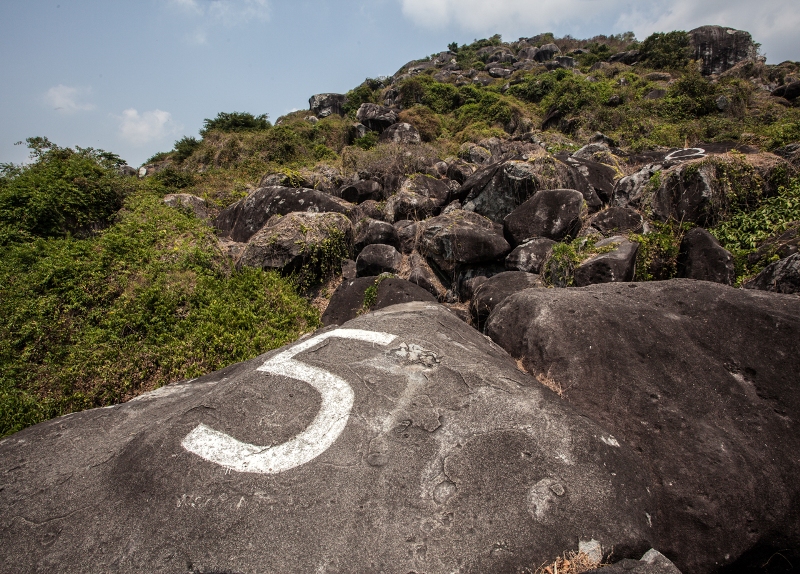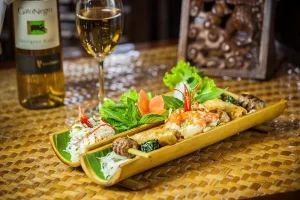Less than an hour’s drive southwest of Chau Doc lies Tuc Dup Hill. Standing 216m high, this outcrop of large, smooth boulders is perhaps better known as ‘Two Million Dollar Hill’, the amount of money the US purportedly spent on bombs in an unsuccessful attempt to take the hill during an intense 128 day battle from November 16, 1968 to March 24, 1969.
Convenient walkways and stairwells now make it easy to climb the hill, however, once at the caves, steep descents and extremely narrow passageways reveal how difficult it was to wrest away control of the hill which houses a network of naturally connecting caves, making it an ideal strategic base of operations during the American War.
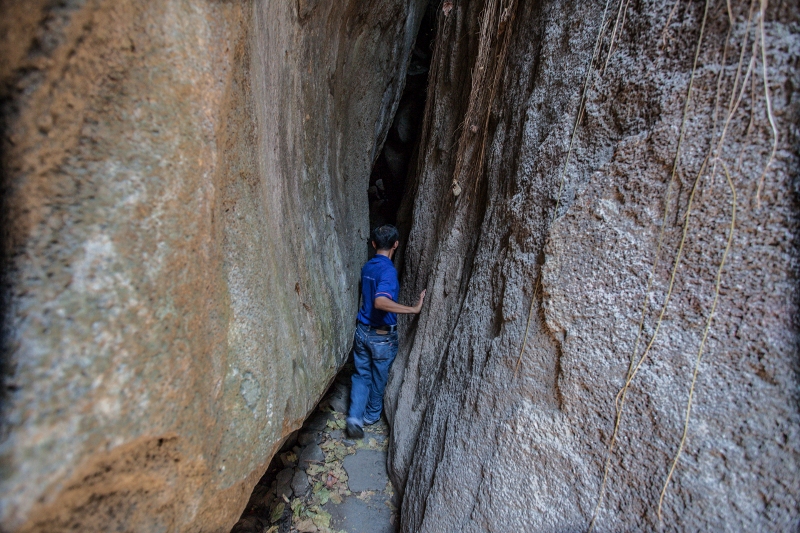
We are accompanied by Le Thanh Cu, 82, one of the oldest surviving members of the resistance fighters from that epic battle. The occasional gunfire reverberates loudly against the rocks, but today, they’re courtesy of an oddly-placed gun range at the foot of the mountain where tourists pay 50 cents (USD) to shoot AK-47 bullets at distant wooden targets. I glance nervously at Mr. Cu, wondering whether the noise triggers any bad, PTSD-induced memories. But he soldiers on, a broad smile plastered on his weathered face.
“The bombs were so loud,” he remembers. “We had to brace ourselves against the rocks so as not to be injured by the shock waves.”
Leaving Mr. Cu on a shady bench, we walk up the hill and spend some time exploring the caves, each serving a different purpose, some now equipped with life-sized dioramas depicting wartime activities.
“We were 260 people, soldiers and civilians, including the family of the soldiers who had to take refuge or else they’d be tortured,” relates Mr. Cu. “There were nearly 20 women who fought with us and three or four children were even born during those 128 days, but not a single one was born normal. Because of the chemicals, some were born blind or deformed by malnutrition. We didn’t know how long the battle would go on. Every day, it was B-52 bombers and helicopters and chemical weapons. But the local people helped us by supplying us with food. We had water from the natural springs and caught fish. We had very few weapons. I remember actually using a rifle and waiting until the pilots flew very low to fire on them or at the fuselages. I don’t know how we were able to defend that hill.”
Now Mr. Cu lives just down the road from Tuc Dup Hill (Khmer for “water that flows at night”, referring to the natural springs in the caves, one of the reasons the Viet Minh were able to hold out so long) in a modest wooden home whose walls are lined with military certificates and awards. “Leaves never fall far from the roots,” he says by way of explanation of why he chose to settle so close to the site of his proudest victory.
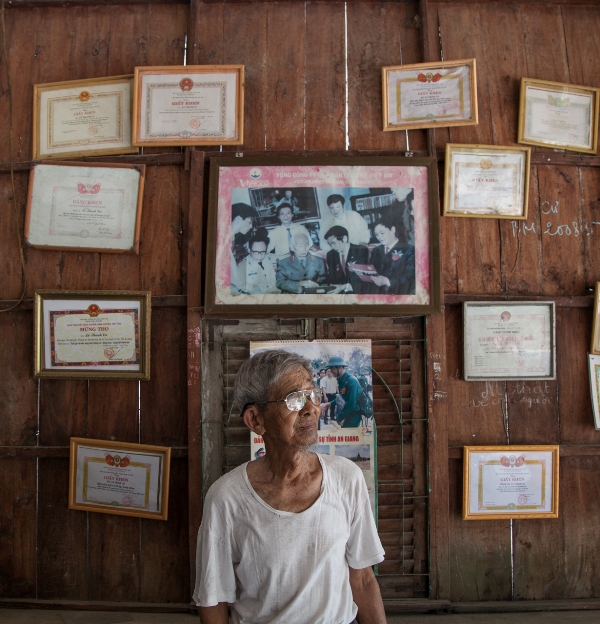
Over a lunch of salted spare ribs and curry chicken prepared by Mr. Cu’s wife, we’re keen to learn about this career soldier whose easy laugh and ever-present smile belies a life of hardship and patriotism.
Leaving home and his four brothers and sisters at 16 to join the army, first fighting the French and then the Americans, Mr. Cu recalls the emotions that led this otherwise peaceful man into a life of war. “The French burned our house many times. It got so we didn’t have anywhere to live. I wanted an independent Vietnam, not under anyone’s rule. I was ready to sacrifice my life so that my family could receive a soldier’s pension.”
“Then came the Americans.” His eyes take on a faraway look as he tells a complicated story involving an elephant, a snake and a chicken. It’s hard for the octogenarian to tell his life story chronologically. More often than not, his musings jump from one period to another, peppered with personal accounts.
“In Vietnamese, we have a saying that you bring in a snake to kill the chickens. That’s what happened. The South Vietnamese (represented by an elephant) brought in the Americans (likened to a snake) to kill their own brothers (the domestic chickens). They used Vietnamese to fight Vietnamese, Khmer to kill Khmer. I couldn’t bear it. They wanted war. I wanted peace.”
It was perhaps the battle at Tuc Dup Hill that best symbolized his lifelong quest for peace and unification, all against tremendous odds and much better equipped opponents. “There were so few of us and so many of the enemy,” he says. “We couldn’t fight them face to face. We had to crawl [in the caves] like cats and rats.”
He relates how sympathetic villagers would hide food in nearby bushes for them to retrieve at night. “We didn’t know how long the battle would go on. We thought that we’d either die from hunger or from bombs. So many people suffered. Eventually, there were only 36 of us left. But we held on. At the end, we were elated, victorious, but also sad for our friends and relatives.”
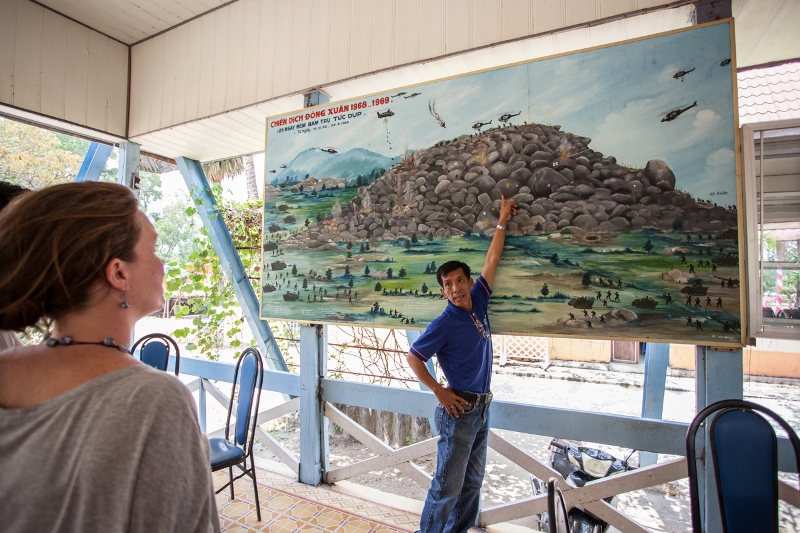
“My heart has changed since then, though. I know it was the fault of the politicians, not the people. I have no anger left. We were all stupid then. All we knew how to do was pull the trigger.”
If you go: Buses from Chau Doc make the 45km trip to Tuc Dup Hill (Tri Ton District), but the last few kilometers require a motorcycle or taxi. There are maps (in Vietnamese) explaining what each cave was used for. Entrance is VND 15,000 per person to visit the caves. There is a cafe, a shooting range and a small pond where you can buy quails to feed the crocodiles.
Alternatively, The Victoria Hotel Chau Doc offers an excursion that visits Tuc Dup Hill (complete with meeting a local war veteran) along with a trip to the stunning Tra Su Bird Sanctuary nearby. Enquire at the tour desk at Victoria Chau Doc or email: [email protected]
